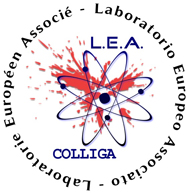Orateur
Dr
Marc Olivier Frégeau
(GANIL)
Description
Super-heavy compound nuclei (Z = 120 and 124) with long fission times (t ≥ 10-18s) have been recently evidenced through experiments [1] applying the crystal blocking technique. This method, because it
requires high quality monocrystalline targets, cannot be generalized to define and locate possible islands of stability in the super-heavy region. An alternative approach is to use the fluorescence technique which looks for emission of X-rays characteristic of the compound nucleus formed. The first reaction studied in this way has been 238U+64Ni at 6.6 MeV/nucleon leading to Z=120 compound nuclei. We will discuss this method and its application for the very first time in the super-heavy elements
region, and present our latest results and conclusions.
[1] M. Morjean et al., PRL 101 (2008) 072701
Auteur
Dr
Marc Olivier Frégeau
(GANIL)
Co-auteurs
Abdou Chbihi
(GANIL)
Anna Corsi
(INFN Milano)
Antoine Drouart
(CEA/IRFU/SPHN Saclay)
Constantin Ciortea
(IFIN Bucarest)
D. Dumitriu
(IFIN Bucarest)
D. Fluerasu
(IFIN Bucarest)
Daniela Fabris
(INFN Padova)
Dominique Jacquet
(IPN Orsay)
Fabiana Gramegna
(INFN Legnaro)
John Frankland
(GANIL)
Laurent Nalpas
(CEA/IRFU/SPHN Saclay)
Laurent Tassan-Got
(IPN Orsay)
M Gugiu
(IFIN Bucarest)
Marian Parlog
(LPC Caen et IFIN Bucarest)
Marie-France Rivet
(IPN Orsay)
Maurice Morjean
(GANIL)
Sandro Barlini
(INFN Firenze)
Tommaso Marchi
(INFN Legnaro)
V. L. Kravtchouk
(INFN Legnaro)
Xavier Ledoux
(CEA/DAM/DIF F-91297 Arpajon)
Éric Bonnet
(GANIL)

